|
Recent Entries to this Blog
The Story of the Knights of the Round Dining Table Part 1
Posted: 12 Feb 2024 Posted: 21 Oct 2021 Posted: 21 Jul 2013 Posted: 28 Aug 2012 Posted: 21 Aug 2012 All Entries |
Oslo, Norway - Getting One's Sea LegsNorway has a lot of sea shore, so a lot of what's happened up here has happened on or near the sea. Let's look at a few examples: Fritjof Nansen sailed north, froze his ship, crew and himself into the ice and drifted past the North Pole. More or less. From 1893 to 1896 they lived on the ship "Fram" bar the little 120 km ski trip they took in 1895 to reach the North Pole. They didn't quite but it was close enough. The polar ship "Fram" sits at a museum in Bygdøy, Norway: 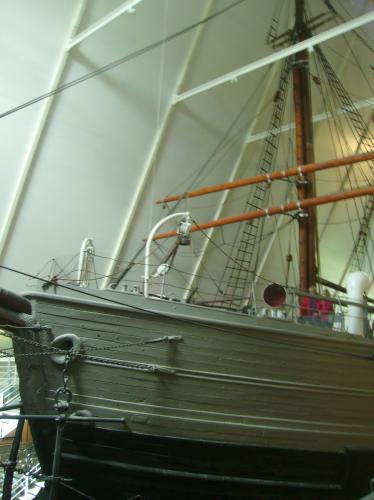
Nansen's ship "Fram" ( photo / image / picture from Droopy's Garden ) Roald Amundsen also wanted to go exploring so he took "Gjøa" through the north-west passage. They left Oslo in 1903 and reached Nome, Alaska in 1906, so he got to prove that it could be done. This is the "Gjøa" in Oslo: 
"Gjøa" ( photo / image / picture from Droopy's Garden ) Mr. Amundsen then decided to go for the magnetic North Pole and borrowed "Fram" from Nansen in 1910. Unfortunately for Amundsen Robert Peary beat him to it so he decided to pull a fast one. He sailed to Madeira and there informed the ship's owner (Mr. Nansen) and the crew that they were going to the South Pole instead and those who wouldn't go could leave the ship and hitchhike home to Norway. None left and Amundsen reached the South Pole on December 14th 1911. Mr. Nansen had observed the sea's currents and had thought to himself that there had to be a current past the North Pole. He proved himself right, and thereby inspired a chap called Thor Heyerdahl. Mr. Heyerdahl didn't much care for the accepted scientific theories as to where the Polynesian's ancestors came from so he decided to prove his own theories, which he did on the balsa raft "Kon-Tiki" in 1947. He floated across the water from Peru to Polynesia and that was that. Then Mr. Heyerdahl pondered the idea that Africans and South-American natives had a lot in common. To prove that they could be related he decided to sail from Morocco to the Caribbean on a papyrus raft called "Ra". He succeded there too, albeit on the second try. These brave sea-faring men did a lot in order to prove their theories, but my guess is that they also got their inspiration from the Norwegian sea-faring tradition. Norway is very long and it's coast line is even longer (if you count the fjords - going in and out of them takes forever, at least in a sail ship). We know that Norwegian Vikings went to England, France, Spain and Turkey. They also went down the Russian rivers to the Black Sea. One of our chiefs even went to Jerusalem. We're fortunate enough to have some splendid viking ship specimen in our museums, and also written sources about the vikings, their day-to-day life, trade routes, ships, beliefs and so on. The Viking Ship Museum at Bygdøy near Oslo show some very nice examples of viking culture and ships. This is the rear end of the Oseberg ship, dug out near Tønsberg in 1904: 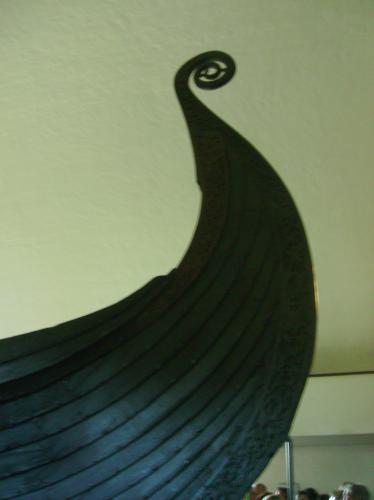
The Oseberg ship ( photo / image / picture from Droopy's Garden ) Believe it or not, but this ship was used as a coffin. A prominent lady was buried inside it in 834, along with a younger woman, animals, crockery, food, jewels, clothes and things one might need for a comfortable after-life. It's not a small ship at all: 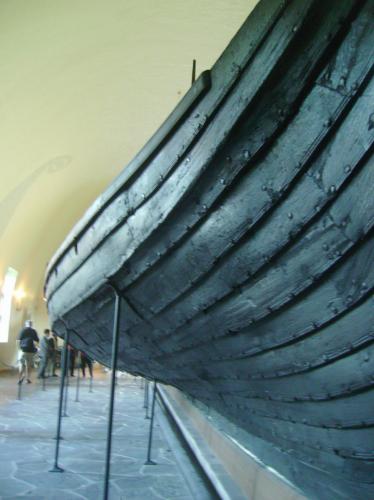
The Oseberg ship ( photo / image / picture from Droopy's Garden ) Nobody knows who the lady is but there are many theories. The ship itself was built in 820. Since it's very decorated and hard to manuever the scientists think she was built for show rather than for sailing long distances. The carvings are wonderful: 
The Oseberg ship - decor ( photo / image / picture from Droopy's Garden ) The ship as it can be seen now is 90% original wood-work, which is pretty amazing when you think about how long it was buried for. Another well-preserved ship is the Gokstad ship which was dug out in 1880: 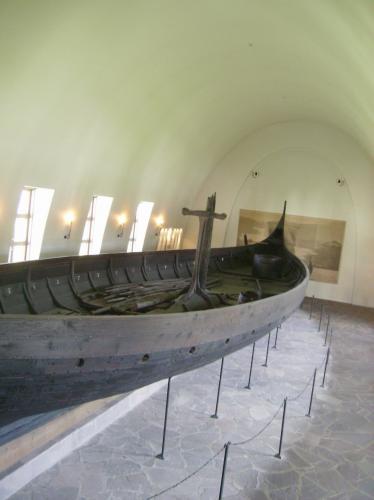
The Gokstad ship ( photo / image / picture from Droopy's Garden ) This ship had a man inside. The archaeologists found horses, dogs and miscellaneous weapons and clothes with him, and he must have been an important person. He was placed in a funeral chamber onboard the ship. You can see the funeral chamber behind the remains of tht Tune ship: 
Burial chamber and two small boats ( photo / image / picture from Droopy's Garden ) In addition to being good navigators at sea the vikings also appreciated good handicraft. These nice items were found inside the Oseberg dig: 
A wagon found by the Oseberg ship ( photo / image / picture from Droopy's Garden ) 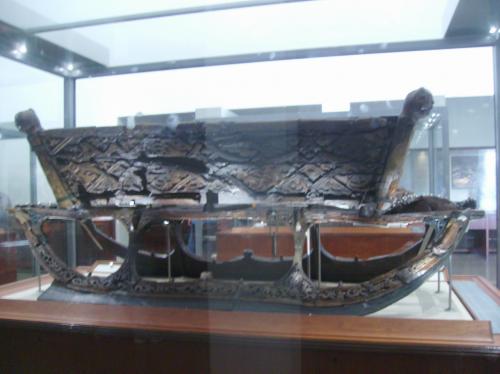
From the Oseberg dig - sleigh ( photo / image / picture from Droopy's Garden ) 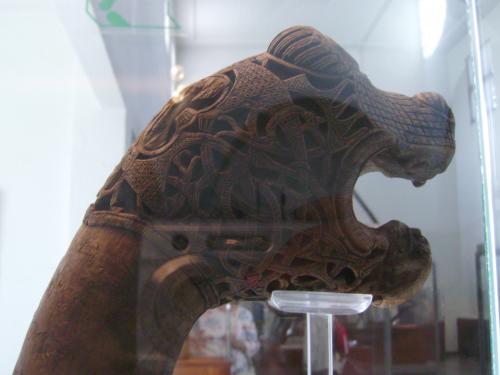
From the Oseberg dig - nice dragon's head ( photo / image / picture from Droopy's Garden ) 
Close-up of replica of part of the Oseberg ship ( photo / image / picture from Droopy's Garden ) Whoops, I thought I was going to rant about Norwegian cultural life today, but it seems I'll have to leave that for another day. I need my beauty sleep. :D Sorry for getting carried away like this. I always do. This blog entry has been viewed 2006 times
You're reading one of many blogs on GardenStew.com.
Register for free and start your own blog today.
Well now, Droopy-- You have outdone yourself this time. All this tradition and history in one posting.
Fascinating read. It's amazing to me just how fearless and brave these men were. Great photos of those wonderfully crafted wooden ships. That last shot shows just how talented those ship builders must have been ... such beautiful carving.
Droopy I'm so enjoying reading about the history and traditions of the Vikings in your blog. The carvings are amazingly beautiful and detailed. I'm so glad they were uncovered and that you are able to tell us so much about them. I'm already thirsting for more information so sleep tight and I hope you'll have the time to tell us more very soon.
Thanks so much for the photos and history. I love studying items like those and trying to picture what the people were like and what was happening.
Forgot to mention that I read Mr. Heyerdahl's book "Kon-Tiki" many years ago and loved it.
Very interesting pictures Droopy,..i am always fascinated with Viking history,..its so much a part of Irish history as well.
Thanks all. Sjoerd, the wood was probably tarred to begin with, and then probably drew pigments from the earth and got even darker. I guess the preservation has something to do with it too.
Droopy--Fascinating. The carvings are beautiful. Interesting to hear some of the history of your country. Thank you.
I'so glad to see you are home I love all history of anythingI enjoyed the storiesand the gorgeous carvings.Welcome home Login or register to leave a comment. |
Archives
All Entries |

